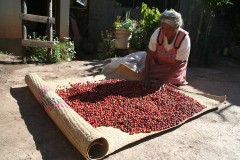
When we think about food price stability, we typically only think about its impact on food security. However, variations in food markets also affect the ways in which these foods are produced. In many regions of the world, crop production occurs under intensive production systems that deteriorate natural resources and contribute to global warming. It is clear that more sustainable, environmentally friendly production systems are needed. Thus, efforts to increase food production in order to achieve global food security should involve a careful, integrated, collaborative approach to ensure the efficient and sustainable use of land, water, and energy at the global level.
|
“A smooth global food trading system that makes markets more predictable can both facilitate improved food security and support more sustainable production systems” |
Given that regional food production and consumption imbalances are, and will continue to be, very relevant, trade plays a crucial role in addressing this challenge. A smooth global food trading system that makes markets more predictable can both facilitate improved food security and support more sustainable production systems. However, global agricultural trade continues to be seriously limited by harmful trade policies. In the midst of the COVID-19 crisis, some countries have rapidly taken measures that negatively impact international trade flows and food availability and that generate greater food price variability. These types of measures are inconsistent with global food security goals, as well as with the need to tackle natural resource deterioration.
Despite its increasing importance, the promotion of sustainable food systems for global food security has not been considered seriously enough by the World Trade Organization (WTO) in international trade negotiations in recent decades. Global leaders need to pay more attention to the extent to which trade barriers not based on evidence are negatively affecting food security, global warming, and natural resource availability.
In the context of this weakened international dialogue, the G20 could play an important role by promoting policies and measures to facilitate dialogue and information exchange and to foster agreements between food trading partners based on a more open global trading system. As such, the T20 prepared a Policy Brief for the current Saudi Arabia G20 presidency suggesting a strategy for more sustainable agricultural trade and development. The brief put forth two proposals covering improvements in sustainable crop production and the promotion of information exchange to foster trade agreements between food trading partners.
The first proposal relates to the need to increase agricultural productivity and total food availability while taking into account the impact of agricultural production systems on climate change and natural resource sustainability. Some countries have implemented technological innovations and production processes that have increased competitiveness and productivity through environmentally friendly production systems. Some of these technologies and strategies could be adopted globally. To do so, however, it will be necessary to systematize a large amount of information and to develop a coordinated global strategy. Improvements in the measurement of sustainable crop production practices, such as no-till and cover crop practices, will be needed, as will further research into the accurate measurement of productivity, soil recovery, water availability in relation to cultivated land, and overall arable land availability.
The second proposal relates to the two main elements needed to achieve environmentally sustainable food security: balanced and sustainable global production systems and a smooth agricultural trading system. Current trade tensions between the USA and China have introduced volatility, uncertainty, and trade diversion into certain food commodity markets. For example, the price and quantity of soybeans exported by Brazil to China were significantly affected by the import tariff imposed by China on USA imports (Gale, Valdes and Ash, 2019). Given the present situation created by the COVID-19 crisis and its potential negative consequences, such as additional restrictions to trade, it will be crucial for policymakers to understand the potential impacts on food security in net importing countries and on macroeconomic stability in food exporting countries.
One way to do so would be for the G20 to create and facilitate a special group of member countries within the WTO with high interest in agricultural trade and environmental sustainability. This group would be aimed at promoting dialogue, discussing proposals and progress in special trading agreements to facilitate agri-food trade, and promoting environmentally sustainable practices. The G20’s Agricultural Market Information System (AMIS) could be used to create this group and generate a space for dialogue and the collection of relevant information, such as sustainability indicators.
Similarly, GEOGLAM, another G20 initiative, could be used to measure carbon sequestration and balance using earth observation technologies at a global and national level.
A smooth global food trading system brings with it several important environmental and food security contributions. These contributions justify all possible efforts to sustain and strengthen global governance systems, such as the WTO, that contribute to a vibrant multilateral trading system serving all countries and encouraging a more viable and prosperous world.
 Pablo Elverdin is coordinator of strategy and content for the Group of Southern Producing Countries (GPS) and has been an external consultant for the International Food Policy Research Institute (IFPRI) and the Inter-American Development Bank (IDB), among other international organizations.
Pablo Elverdin is coordinator of strategy and content for the Group of Southern Producing Countries (GPS) and has been an external consultant for the International Food Policy Research Institute (IFPRI) and the Inter-American Development Bank (IDB), among other international organizations.
 Martin Piñeiro graduated from the University of Buenos Aires and holds a Ph.D from the University of California. Dr. Piñeiro is Director of the CEO Group, Chair of the Committee on Agriculture of the Argentine Council of International Relations (CARI), Argentina. He is a member of the GPS Network, and Special Adviser to IICAs DG. Previously, he was Undersecretary, for Agriculture, Argentina, Director General of the Interamerican Institute for Cooperation on Agriculture (IICA), Member Board of Trustees and Chair of Program Committee of the International Service for Agricultural Research (ISNAR), and Board Chair International Food Policy Research Institute (IFPRI).
Martin Piñeiro graduated from the University of Buenos Aires and holds a Ph.D from the University of California. Dr. Piñeiro is Director of the CEO Group, Chair of the Committee on Agriculture of the Argentine Council of International Relations (CARI), Argentina. He is a member of the GPS Network, and Special Adviser to IICAs DG. Previously, he was Undersecretary, for Agriculture, Argentina, Director General of the Interamerican Institute for Cooperation on Agriculture (IICA), Member Board of Trustees and Chair of Program Committee of the International Service for Agricultural Research (ISNAR), and Board Chair International Food Policy Research Institute (IFPRI).
 Valeria Piñeiro is a Senior Research Coordinator at the International Food and Policy Research Institute. She is also a faculty member at the Johns Hopkins University Advanced Academic Programs. She has also consulted for many organizations, including the World Bank.
Valeria Piñeiro is a Senior Research Coordinator at the International Food and Policy Research Institute. She is also a faculty member at the Johns Hopkins University Advanced Academic Programs. She has also consulted for many organizations, including the World Bank.
 Estefania Puricelli has a Master’s in Agricultural Economics from the University of London, a degree in Agricultural Economics and Farm Management as well as a degree in Economics, both from the University of Buenos Aires. Estefania manages and coordinates the monthly AMIS Market Monitor report, the primary product of AMIS, a G-20 initiative.
Estefania Puricelli has a Master’s in Agricultural Economics from the University of London, a degree in Agricultural Economics and Farm Management as well as a degree in Economics, both from the University of Buenos Aires. Estefania manages and coordinates the monthly AMIS Market Monitor report, the primary product of AMIS, a G-20 initiative.
 Federico Villarreal is Ph.D. in Geography from the University of Buenos Aires (UBA) and M.Sc. in Agrarian Social Studies from the Latin American Faculty of Social Sciences. Dr. Villarreal is currently director of Technical Cooperation at the Inter-American Institute for Cooperation on Agriculture (IICA).
Federico Villarreal is Ph.D. in Geography from the University of Buenos Aires (UBA) and M.Sc. in Agrarian Social Studies from the Latin American Faculty of Social Sciences. Dr. Villarreal is currently director of Technical Cooperation at the Inter-American Institute for Cooperation on Agriculture (IICA).
Note: This a cross-post that originally appeared published in:
http://www.foodsecurityportal.org/food-market-stability-necessary-step-global-social-and-environmental-sustainability.
The opinions expressed in this article are the responsibility of the authors and do not necessarily reflect the opinion of IICA.
Add new comment